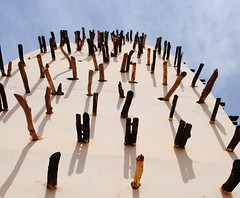Cookies, M n’ M’s, spokes and a new Nikon D3000.
Our Christmas arrived a little late. According to the man in the North London DHL shop all the drivers were ‘on holiday’, until he was reminded of our package so it seemed!
The incredible journey of our little box began on December 30th when Imran’s wonderful brother reminded the shopkeeper of its existence having taken the box to him 8 days before…
First our lovely box was flown to Brussels, held for a few hours before being sent off on a flight to Dakar, Senegal.
Next came a connecting flight from Dakar to Lagos, Nigeria.
Then from Lagos our beautiful box flew to Abidjan, Cote D’Ivoire.
Then, on its final aeronautical adventure it travelled from Abidjan to Bamako.
‘KHAN?!’ The woman bellowed down the telephone.
Imran glanced at me and we both knew in a second it was the call we had been waiting for. We had been tracking the rather strange route of our box for a few days and, in the knowledge that we would soon need to leave for Timbuktu and the Festival au Desert, we were anxious for the arrival of our replacement camera.
‘KHAN! Ibrahim Khan?’
‘Yes… this is Ibrahim’, it was easier this way.
‘This is DHL Bamako, your package has arrived. You must pay 15,000 CFA if you want the package. You must come to the airport with the money’, the line went dead.
Though lacking in the Godfather-like tone her demands sounded fairly non-negotiable and we set off for the airport.
The door of the DHL office slammed shut and I found myself looking seriously disgruntled as we sat down in front of a large heap of paperwork.
‘Sign here, here, here, here and (after multiple page turning), here.’
It was nearing the end of the working day and anxious to get the package Imran gave the paragraphs a quick read before scribbling away.
‘You must pay 15,000 CFA now to release the paperwork and then whatever customs asks for…’.
Realising that we might have to hand over large sums of cash I began to moan and whine indiscriminately, polishing the performance with an emotional emptying of coins onto the desk of the uncomfortable looking member of staff.
She glanced to her colleague and inhaled deeply before glancing at my quivering face,
‘Well, I suppose we can ignore the 15, 000 CFA here, just this once, but you will still have to pay customs.’
The customs women laughed as we approached, with their feet resting on the table, they moved only in the effort to bark loudly at poor Mohammed who was running frantically around the warehouse floor.
‘What’s in the box?’.
Sighing heavily I began to present them with each item as Imran gave an explanation in French. But, it seemed fate had dealt us a good hand and the women were quickly won over.
The first item was drawn from the box, ‘tampons’ Imran politely translated. The women howled with laughter and grinned warmly in my direction.
‘Cookies, bicycle parts…’, the list continued as did the explanation of our trip, lack of children and subsequent challenge to the claim that the lack of children was resulting from our bicycles.
After building something of a rapport with the formidable team we felt more confident, as the senior member jotted down the customs note Imran smiled. Our new friends had intentionally omitted the expensive camera from our customs list. But now we were told, came the final and most difficult stage, an appointment with Mamadou Ba, Head of Customs in Mali. Admittedly it seemed a little over the top for a DHL package but in no position to argue we set off for the next office.
Busy with a text message the security guard missed us as we marched towards the Chief’s office. A short wait later we were instructed to knock on the door,
‘Come in,’ glittering with colourful medals Mamadou continued to gaze past us and his girlfriend focusing intensely on the television, ‘I am closed for the day, you must come back another time.’
I took a long breath in and turned away resisting the urge to throw something in his general direction.
‘Tell her to calm down’, assuming this was directed at me and not his teenage girlfriend the aging Mamadou asked us again to leave.
Realising it was once again time to call on the distressed-tourist within, I began to look flustered, on the verge of tears.
Mamadou shuffled in his seat and Imran seized the moment to win his signature. Ten minutes later Mamadou lifted his pen and as we relished in the beauty of our victory, signed on the dotted line.
We ran back to the warehouse triumphantly waving the paper at Mohammed and finally as the day came to a close our box was ‘released’ from the jaws of customs.

12.650000
-8.000000



























































